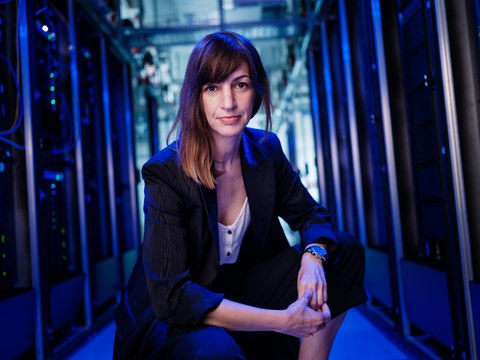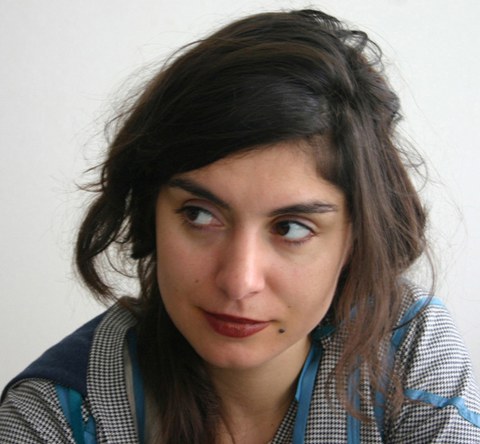Jun 30, 2021
The Schaufler Lab@TU Dresden has nominated the internationally renowned artists Esmeralda Conde Ruiz and Rosa Barba as artists in residence for 2022 and 2023
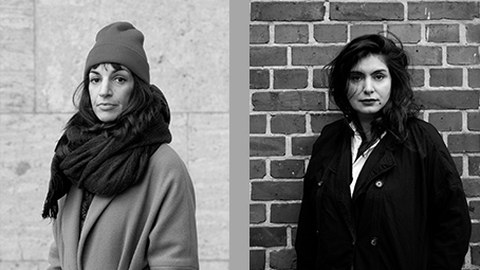
li.: Esmeralda Conde Ruiz, Artist in Residence 2022 / re.: Rosa Barba, Artist in Residence 2023
This year, the Schaufler Lab@TU Dresden has nominated two artists in residence, who will explore the topic of Artificial Intelligence (AI) and cultural change during their stay at the TU Dresden (TUD) over the next two years: starting in April 2022, the prize-winning composer Esmeralda Conde Ruiz will be in residence for six months as the third fellowship recipient of the Artist in Residence Program. The internationally renowned filmmaker and installation artist Rosa Barba was selected by the jury as the fourth artist, for the extended funding period in 2023.
These artists succeed fellowship recipients Christian Kosmas Mayer (2020) and Anton Ginzburg (2021). Just as their predecessors, they will pursue artistic projects together with young scholars in the graduate school and in transdisciplinary exchange with various university departments during their residencies.
Esmeralda Conde Ruiz (b. 1980/Spain, lives in London) works as a composer and conductor at the interface between music and visual arts. She has collaborated with famous artists such as Yoko Ono, Olafur Eliasson, Johann Johannsson, Robert Wilson and Susan Philipsz. She drew international attention with her 500-member choir, which performed at the opening of the Tate Modern 2016 expansion in London with Peter Liversidges’ “The Bridge.” In addition, Conde Ruiz conducted at the Elbphilharmonie Hamburg, at the Auditorium Parco della Musica Rome, at Haus der Kulturen der Welt Berlin, at the Barbican Centre, London and elsewhere.
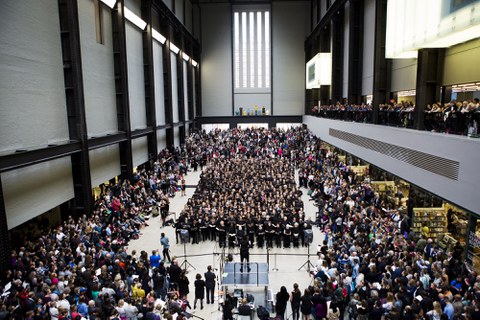
Aufführung „The Bridge“ von Peter Liversidge in der Turbinenhalle der Tate Modern, London/GB, 18. Juni 2016
Her work with large choirs has also included David Lang’s “the public domain“ at the Berliner Philharmonie (2018) and at the New York Lincoln Center (2016). Currently, Esmeralda Conde Ruiz is the music director for the “Station Clock“ by Turner award-winner Susan Philipsz, an enormous “sound clock” with 1,092 singers for the new train station in Birmingham. At the same time, she is composing a “Waste Trilogy” for a project at the Dresdner Philharmonie, that will debut in 2022 with 350 children from all over the world.
For her residency at the TU Dresden, the artist plans to develop an AI choir:
“I am curious as a composer to research the sonic idea of an AI Choir: An AI Choir that is not based on copying the human sound but creating a unique new instrument. One that might be inspired by the mechanisms of human choirs but that brings new sonic qualities, languages and ideas. How could it sound like, how should it sound like and could we built one? I’d like to develop this concept in experiments and workshops with AI and real choirs and through exchanges with various scholars at the TU Dresden. The result will be a sound installation as well as a visual representation of the discoveries.” (Esmeralda Conde Ruiz, June, 2021)
Rosa Barba (b. 1972/Italy, lives in Berlin), Artist-in-Residence 2023, engages conceptually within the medium of film through a sculptural approach. In her works, Barba creates installations and site-specific interventions to analyze the ways film articulates space, placing the work and the viewer in a new relationship. Questions of composition, physicality of form and plasticity play an important role for the artist as Barba examines the industry of cinema and its staging vis-à-vis gesture, genre, information and documents.
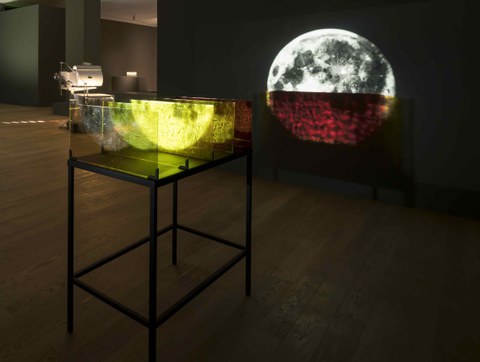
„Drawn by the Pulse“, 2018 35mm Filminstallation, ohne Ton, Ausstellungsansicht Kunsthalle Bremen, 2018
Her film works are situated between experimental documentary and fictional narrative. They often focus on natural landscapes and human-made interventions into the environment and explore the relationship of historical records, personal anecdotes, and filmic representation, creating spaces of memory and uncertainty.The artist has exhibited her work at the Tate Modern, London, at the Jeu de Paume, Paris, at the Albertinum Dresden, at the MAXXI, Rome and elsewhere. She has conducted research at various universities, including Harvard and has been awarded numerous prizes. In summer 2021, she is presenting a location-specific installation for the reopening of the Neue Nationalgalerie der Staatlichen Museen in Berlin.
At the Schaufler Lab@TU Dresden, Rosa Barba will explore the concept of the archive and the possibilities of AI:
“For my artistic work, reference to scholarly research topics is quite central, so I am very glad to be able to develop my exploration of archives as storehouses of knowledge in the context of artificial intelligence during my time as a fellowship recipient of the Schaufler Residency@TU Dresden in 2023. In collaboration with scholars at the TU Dresden, a new work will be created that represents a physical storage place between machine and sculpture whose genesis, at the same time, is based on digital processes. This tension between an object-bound piece and fluid, global knowledge is of particular interest to me.“ (Rosa Barba, June 2021)


